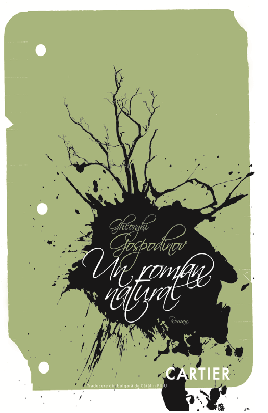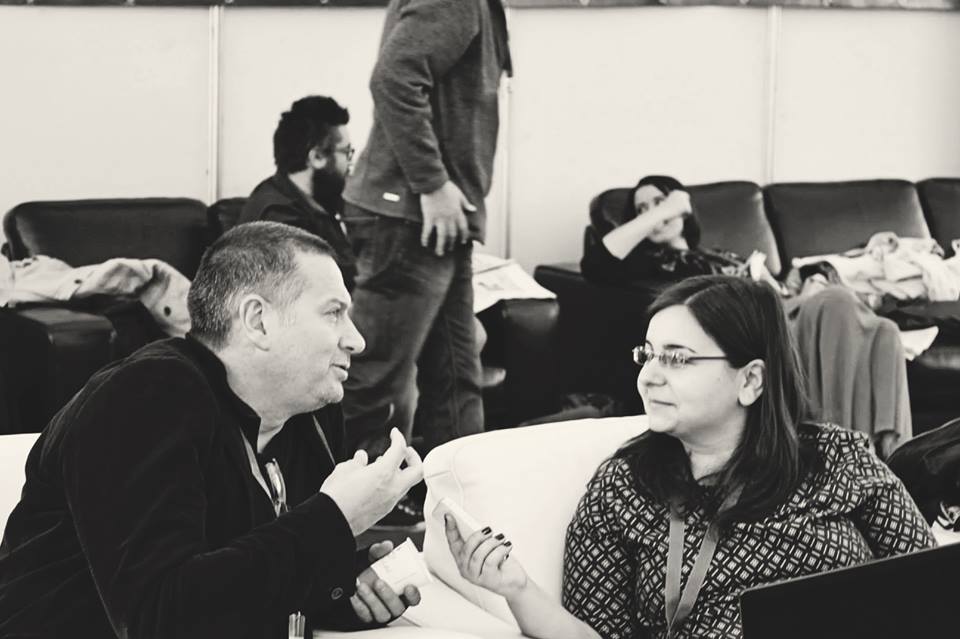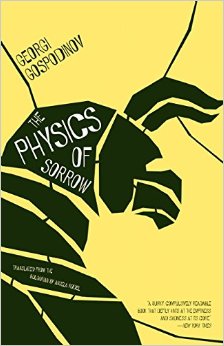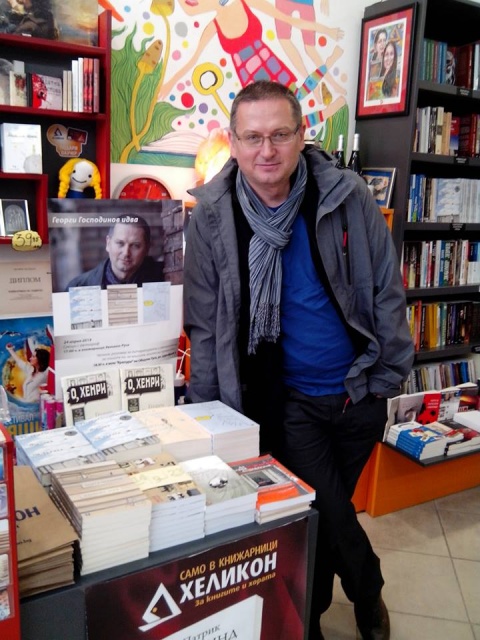
Gheorghi Gospodinov is one of the best known and most translated Bulgarian writers after 1989. He published four books of poetry, a volume of short stories (And Other Stories, 2001), two plays – D.J. (Don Juan’s initials, 2004) and The Apocalypse Comes at 6 pm (2010, the American premiere was in 2014), but he also wrote scripts for short films (the most recent film is Omelette; mention at Sundance Film Festival, 2009) and he created a graphic novel, The Eternal Fly (2010, together with the artist N. Toromanov).
Rewarded with many national awards for his writings, Gospodinov published his first novel, A natural novel, in 1999. The Bulgarian author became internationally known when his novel was translated into 23 languages – in Romanian it was published in 2011, at Cartier Publishing House, translated by Cătălina Puiu – and it was edited seven times in Bulgaria. His second novel, Physics of Sorrow, was published in 2012, it won three national awards for literature in 2012 and 2013, and it was translated into Italian, German, Serbian, English and French.
Gheorghi Gospodinov was a guest of the second edition of the International Literature and Translation Festival in Iași. So I had the opportunity to talk with him about A natural novel – its structure, writing, sources of inspiration, etc. -, but also about his other writings, the importance of reading and words in the technology and audio-visual era, the Bulgarian culture, the Romanian authors that he read or wants to read and many others things.
Pentru versiunea în limba română, click aici.
A natural novel is a very intellectual book – let us not forget that the teller, for example, declares that he wants to write a novel about anything or to write only beginnings etc. During my reading, I had moments when I compared it with one of Italo Calvino’s books, If on a winter’s night a traveler.
Actually, I read Italo Calvino after I finished my novel, when other people told me the same thing you are telling me now. I was curious and I read it. Unfortunately, Calvino was published very late in Bulgaria, some time after I published mine.
Very interesting! I didn’t know that.
Getting back to my question, your book is impressive. How long did it take to write it? And the structure of the book is both very complex and special. I am very interested to know how you started, how you worked, what’s the story behind it, the one that nobody knows besides you.
Practically, I wrote it in two and a half months. But some of the chapters, ideas, titles, I had in my notebooks for three-four years. I was obsessed, in the beginning, by the natural history, how the natural historian of the 18th century had a global vision about the world; they looked at it from a very different perspective – when they described an animal, they described not only how it looked, its appearance, but also how you can approach it or cook it. A whole picture, I would say.
When I started to write my novel, I was very depressed, I had a very difficult period in my life, and I thought about how I would have liked to live in the 18th century or in an 18th century novel, where everything was clear and related. So I decided to tell my story, the story of the character, in a way which is more adequate of the way we are living. I started the novel with many parts, as the eye of the fly, with many facets. The structure of the book has a reason – before this, I never wrote a novel. I came from poetry – I wrote four books of poetry and I was quite famous as a poet -, so this book is written like an illegal book of poetry.
The Romanian edition of A natural novel
A natural history of the toilets or of the flies, very unique perspectives. Can you name a natural history that doesn’t appear in the book, but you thought about it at some point?
A natural history of the words, but it appears, shortly, in the book. In fact, it was the most important natural history for me. I thought very much about it – how, using the natural history of everything, you can invent a natural history of the words, the root of the words, how did they appear, how can they express everything and so on.
„As if just there, in that room and in that language, I manage to relax” (p. 46), says the teller about toilets. In what room can you relax and why there?
In the toilet (we laugh).
Really?
Yes, because it is the only space in which you can distance yourself from the others. For the people who lived during the socialist period, the crisis with the homes, the need to be alone, from time to time, is vital. The same goes for me. It’s very nice to have a place where nobody sees you. It’s a metaphoric space, after all. There, you can read a book, you can cry – for example, as a child I heard, for the first time, an old man crying in the bathroom and, with my childish mind, I thought about it and realized something terrible happened to that man, so he locked himself in the toilet.
I believe the toilet is similar to the confessional.
If we talk about the rooms in a house, the kitchen is quite the opposite of the bathroom in the socialist period. Then, the kitchen was the place where everybody gathered, not the living room, after the capitalist model. I think it was the same in Bulgaria, wasn’t it?
Of course it was! I didn’t know that Romanians did the same. This is very important. In my second novel, Physics of Sorrow, I have a chapter about kitchens. It is a very good metaphor for the times in which we lived. The kitchen is like a bigger toilet, you are safe there – I remember my father slept in the kitchen and, during the night, he locked himself there and listened to Radio Free Europe -, and you are even a hero, a kitchen hero – in this room, everybody could do and say everything they wanted to, but during the day they were part of the system, quiet and in line.
The main character eavesdrops every time he has the opportunity. Therefore I was wondering: as a writer, do you do the same?
Yes, I do the same! I think the writer shouldn’t have a cabinet, a bureau, but the streets, he should be on the streets, in the cafes, listening to the others.
As a child, I was very shy. I lived with my grandparents, so I just listened to their stories. Our grandparents’ stories are different, they are mixed with legends, for example, and I think I was influenced by this. After that, when I wrote the novel, I really loved sitting in a cafe and listening to the other people to see what they talk about. I was obsessed about the small talks, the trivial one, those about the everyday things.
So yes, I use this technique and I call it „the hunting for stories”. The writer is like the hunter. And it’s very important for him to stay invisible – to not have a smell, a face or anything else -, to be a part of the table, as the sugar or the cup of coffee. Many of the stories written, for example that talk between women, are taken from real life. I remember the place and the true story behind it. Therefore, the writer should be the ear that listens, nothing more.
O.k. But the teller also says, at some point, that he wishes he didn’t listen to some stories.
Yes, he does that. Well, the teller feels that the stories he listens to are his, he is very empathetic. For example, he divorced and every person he hears talking about his or her partner, he thinks about he and his wife. When you have a problem, you take everything very personal.
„It’s Saturday. An unbearable, light and cold rain. (…) Actually, a perfect day for Salinger” (p. 110, from the Romanian edition). I liked very much the idea that an author or another can be suitable for a certain kind of weather. Do you have such a list? Who would be perfect to read on a sunny day? But in winter, on a snowstorm?
I like lists very much! In A natural novel, you have a list with the pleasures of the sixties, of the seventies and eighties, and in the new one, Physics of Sorrow, the lists occupy half of the book.
As for the next question, nobody reads in sunny days (we laugh). It is also very difficult to write about sunny days or things. Jacques Prévert is nice for sunny days, actually. And on a snowstorm, Pasternak is suitable.
Gheorghi Gospodinov at one of the meetings at the International Literature and Translation Festival in Iași, 2014
We previously discussed that you talk, as some point in the book, about words. What’s your opinion regarding the power of words nowadays, in the audio-visual era?
Unexpectedly, I am quite optimistic regarding the power of words nowadays. And that’s because I think people tend to go back to words. Storytelling, literature, is also a media, a slow one, that produces meanings. It’s a slow, but a durable meaning. I like very much a legend about Bedouins in the desert – when Bedouins cross the desert, they make many stops; not to rest or to drink water, but to give a chance to their souls to catch them; they believe the soul is slower than the body. So I believe literature is the same, it allows your soul to come closer. It’s very important. I really think that, slowly, people will come back both to their souls and literature.
Do you still teach literature at the university? Did anything change from 1999, when you published in Bulgarian A natural novel, until now?
I still teach, but I have only a few courses. Lately, I travel a lot – recently, I had an interesting experience: I stayed in a monastery for half a year; it’s the experience in which you see how much you can live with yourself -, so I can’t take many classes. I have, for example, a creative writing course. And, because I can’t work with more than ten or fifteen students, I choose between the ones who apply at it.
Now, I’m trying to do something different with those students: I try to encourage them to read more, and afterwards write. That’s why I like this festival so much, because I saw that it encourages the young people to read. I had a meeting here, organized by Alecart, with school children, that impressed me – it was full, many of them addressed very good questions, it was great. I think you are in a good moment here, in Romania, you are on the right path in cinema and literature, people have the energy to do many things. I miss this kind of attitude in Bulgaria, we are full of sorrow there, we have too many untold stories. Maybe something good will happen soon. I saw many Bulgarian directors and writers who started to follow your steps, so I’m optimist.
I think that, because I’m known as a writer, I have a duty to try to give the others the idea that reading can change you, make you better, give you the power to resist the ideological messages. Moreover, I want the next generation, our children, to have memories about books. That’s also why I like to meet with people.
During the interview with Gheorghi Gospodinov – via
I read somewhere that your first novel was received very well, and it must be so since it was translated into so many languages. Can you tell us which reaction delighted you the most?
Once, I had a reading in Austria. And I read one chapter that I usually read, the one when I was nine years old and I saw, for the first time, God as a light bulb and all the story behind it. After reading it, I was afraid they won’t understand it because God wasn’t forbidden for them, they didn’t have our experience. But a young father came to me, with his six years old son, and thanked me for the reading. He said that the whole day he tried to explain to his son what and who is God and he didn’t succeed. It’s nice to give someone an answer to a question you were never asked.
As for the second book, I received a letter from a woman who was in a hospital. She wrote to me that, after reading my novel, she felt that she wanted to live. It’s the best thing, the most important that happened to me. Reviews, prizes, etc., mean nothing compared to it.
It took you twelve years to publish another novel after A natural novel. Why? What did it happen during this period?
Maybe I’m a lazy writer (we laugh).
I don’t think so. Is there another plausible reason?
Well, yes. Other books. Not only poetry books. I think it’s important to break „the Bulgarian culture of silence”, as I call it. We kept the silence about the past, the communist period, the people are still afraid to talk about their personal experiences during socialism. With my friends, we wrote two books, we had two projects: a collection of oral stories from the everyday people, called I lived socialism. 171 personal stories, and the other book, with the small objects used then, is called Inventory book of socialism. On the other side, I published some short stories, some plays, etc. I like to be a beginner. You can fail. You can say: „Oh, well, I tried, but I’m not a novelist”.
Very interesting! And what’s the next thing that you want to try?
A libretto. It will be a Polish opera. I never met the composer. He read my books and he invited me to do it. And I liked the idea, worked on it and I just finished it. Next year it will have the premiere.
Congratulations!
Thank you. And, after twelve years, I wrote another novel.
Now it’s surprising that you even wrote it, taking into account that you said you like being a beginner.
I do, but I finished the genres. I wrote poetry, plays, novels, scripts, the libretto, etc.
By the way, can you tell us more about this second novel?
It’s also a crazy novel. Now it’s published also in Germany and Italy, and some reviewers said it was the craziest book of the season. This is a book about a boy who suffers from a very strong empathy. Because of this, he could go deep in the stories of other people. He feels that all are his own stories. Not all pleasant.
It’s also the story of the twentieth century. Actually, it is also a book about abandon. And about our generation – we lived alone, our parents were working all day long, we mostly stayed with our grandparents and felt abandoned by our parents. The novel talks about these things, it’s a time capsule in structure. It’s not a pure genre.
What Romanian author arouse your interest here, at Iași, and you want to read him or her in Bulgarian?
By the way, much more Romanian authors are translated in Bulgaria than Bulgarian writers in Romania. So, I have in my library books by Mircea Cărtărescu, Dan Lungu, Lucian Dan Teodorovici, Cezar Paul-Bădescu, Mircea Dinescu, Ana Blandiana. Now, because I met them here, I am curious about Matei Vișniec, Varujan Vosganian and I expect to read something by Florin Lăzărescu very soon. And so many other names…
Photo credit for the main picture








